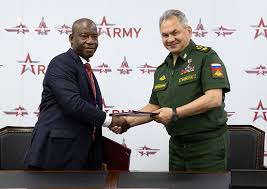The soldiers of the National Transitional Council (CNT), in power since 2020, have intensified relations between Mali and Russia by ratifying a military and technical cooperation agreement.
The agreement also includes economic and humanitarian aspects.
The National Transitional Council (CNT) on Thursday, July 4, unanimously approved a bill by the government of Chogel Kokala Maïga, ratifying a military and technical cooperation agreement between Mali and the Russian Federation.
The agreement, which will be validated by the government’s Council of Ministers, represents a major step forward in strengthening bilateral relations and intensifying efforts to combat terrorism and improve the effectiveness of Mali’s armed forces.
Under the agreement, Russian instructors will train Malian soldiers and police officers. In addition, military equipment will be supplied to strengthen the country’s defense capabilities.
Since the second coup in 2021, Russia has delivered a large amount of military equipment to Mali, although the details of these contracts have not been disclosed.
After the 2020 and 2021 coups, Mali turned to Russia as its main military partner, accelerating the withdrawal of French Barkhane
troops from the country. Western powers accused Mali of using Wagner Group mercenaries.
However, Bamako has always denied these allegations, claiming that the Russians present in Mali are instructors, who have come to train the Malian armed forces.
Despite this cooperation, the security situation has not improved significantly. Attacks continue and the number of victims, especially civilians, continues to rise.
On Monday, July 1, an attack in the Bandiagara region left about 20 people dead. In addition, terrorist groups such as JNIM (the Arabic acronym for Support group for Islam and Muslims) and EIGS (Islamic State in the Great Sahara) regularly carry out deadly attacks, underscoring the persistence of insecurity.
In addition to military cooperation, the agreement includes economic and humanitarian components. In January 2024, reliable sources
confirmed that Russia had delivered 25,000 tonnes of wheat and 17,000 tonnes of fuel to Mali to support food and energy security. These gestures are part of a broader Russian strategy to expand its influence in Africa, replacing former colonial powers such as France.
During Malian Foreign Minister Abdoulaye Diop’s visit to Moscow in February, the two sides also discussed cooperation in the energy, agriculture and mining sectors.
MD/ac/sf/lb/GIK/APA


